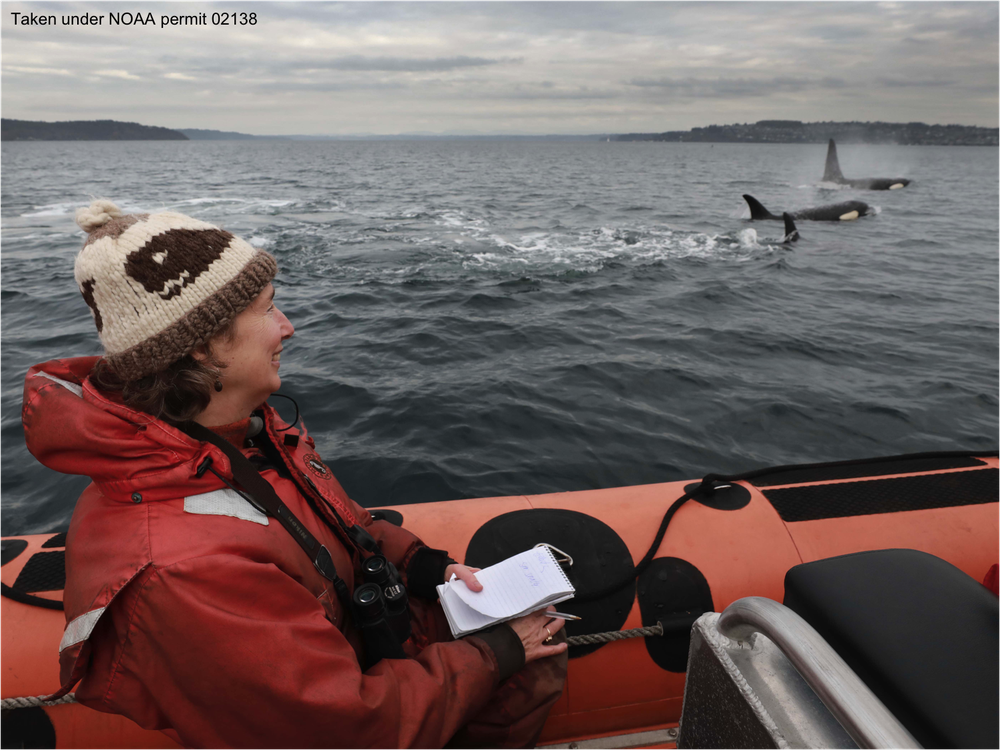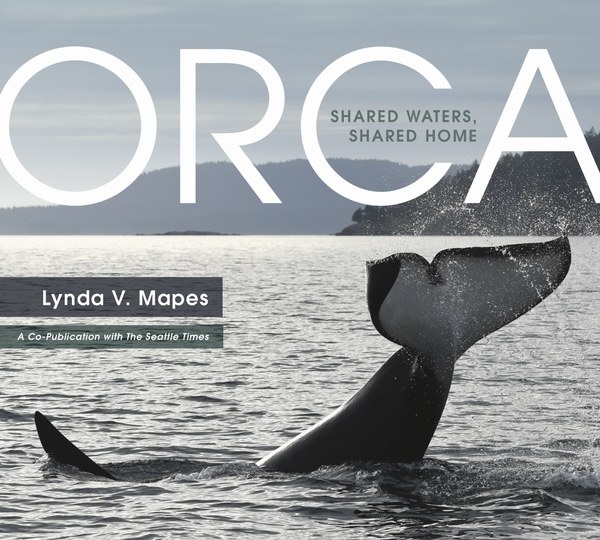
The Mountaineers are proud to call Puget Sound home. From the towering glaciers and old growth forests of Mount Rainier to the stunning waters and diverse wildlife of the Salish Sea, our home is a special place. The natural beauty and adventure of these wild places inspires us to not only enjoy our special spaces but fight for their protection for future generations. That desire for preservation is centered within our core value of conservation. From the mountains to the sea, we are dedicated stewards of our backyard and beyond.
As people have called the Puget Sound home for millennia, the iconic orca whale has thrived in our region right alongside for even longer. They’re deeply intertwined with the natural and cultural history of our region and an essential part of our ecosystem. Sharing home with the wildlife indigenous to Puget Sound is what award-winning Seattle Times journalist Lynda V. Mapes has written about for years, as she’s covered the incredible story of the southern resident orca whales and Chinook salmon - which are both iconic to Puget Sound. As Lynda says, “They are a signature of wildness - of what sets us apart in the Pacific Northwest.”
Just as it would be hard to imagine our region without snow-capped peaks, the prospect of a Puget Sound without the orca raises alarm bells. Yet, as of today, only 72 southern resident orcas live in the Salish Sea. Like the glaciers and old growth forests, the health of these Northwest icons is jeopardized by a host of environmental issues, from climate change to pollution.
Lynda’s forthcoming book Orca: Shared Waters, Shared Home, from our conservation imprint Braided River, explores how the orca’s fight for food, family, and survival has been a powerful activating force for conservation efforts across Washington state. While the Salish Sea may look pristine from shore, under the surface, its two keystone species are in crisis. Pollution, habitat destruction, climate change, and expanding development in Puget Sound all present a serious threat to our beloved orcas.
But we have an opportunity to create meaningful change. On land and in the water, volunteer-driven reforestation and salmon restoration efforts are helping to clean up the Sound for future generations, supporting long-term survival for our orca families.
Orca: Shared Waters, Shared Home will be published by Braided River in collaboration with The Seattle Times in 2021. The book will lay the foundation for an ambitious Braided River outreach campaign, with live multimedia events, expanded programming, and community collaborations. Braided River is currently seeking $60,000 in philanthropic investment to create this book, amplify the impact campaign, and drive towards true conservation wins.
Bring this conservation story to life - and get your name in the book - by making a gift before October 1.

Interview with Author Lynda V. Mapes
In a special interview with Braided River Executive Director Helen Cherullo, Lynda shared what these stunning, critically endangered animals mean for our sense of place.
Sense of place is key to your work, and to my work. The Southern Resident Orcas are a key indicator of the health of the lands and waters of the Pacific Northwest. Can you talk to us a bit more about what you see as at stake in this place we call home with the unthinkable loss of these orcas and salmon?
I want to talk about that from a slightly different place, which is a place of intense joy. So here I am, I’m at my desk in the Seattle Times newsroom on a dreary November day and what happens? I suddenly start hearing from Orca Network that J Pod is in town. They are here! The Southern Residents are right here, in Central Puget Sound. They are literally at the foot of skyscrapers. So what’s the next thing that happens? I go out, and see the residents of Seattle, on the beaches of West Seattle, they are at the south end of Vashon Island, they are pouring out of their offices. They are as thrilled as they could possibly be, and why shouldn’t they be? Here’s this top predator: an orca whale, right downtown. Who else has that? And I think the people of Seattle and the Northwest share a great sense of attachment and pride and thrill about the fact that we still share this home and these waters with these animals, which is why I wanted to call the book Orca: Shared Home, Shared Waters. That’s still who we are.
In 2018, you covered the story of Tahlequah (J35), the mother orca who carried her dead calf for 17 days through Puget Sound, which captured the heart of millions across the world. You just reported a couple weeks ago that Tahlequah is pregnant again. How has Tahlequah’s journey affected you, and what have you learned from readers who have responded to your reporting?
Reporters talk about their career story, the story that will stay with them all their life, and there’s no question this is that story for me. And I think the reason she was such a transformational story for me was the human response to her. It was hearing from people all over the world, hearing from very high-placed political people who said they couldn't sleep at night, they couldn’t function, they were too upset because of what she was going through. I honestly took great hope from that. That people, with everything they’re dealing with in their own lives, could still be touched by a mother whale. It showed me that we’re still people of heart and mind for the vast intelligence that we’re so privileged to live in and among, that is the animals with whom we share this world.
As a journalist you maintain high levels of objectivity. You must subscribe to this discipline to be successful, yet I imagine the work must pull at your emotions daily. How do you achieve this and maintain balance?
Look, this is something I always say when talking about orcas and Chinook salmon. It’s the law. They are protected under the Endangered Species Act. We’re supposed to be doing everything in our power as a community to ensure their survival. And not only their survival, but to ensure they thrive and are returned to abundance. In standing up for them, we’re standing up for what we as a society have called for, and say we embrace.
And it’s a thrill to me to do that, and to, in every way I can, inform and encourage this effort. It’s a long haul and it’s expensive, but honestly we’re starting to do some very exciting things in Washington State. There isn’t a place in the country and therefore the world, that has taken out more or bigger dams than Washington. We are absolutely leading the way in conservation efforts large and small, from as big as the Elwha and Glines Canyon Dam removal project, the ever in the world, to taking out the Pilchuck Dam, the Nooksack Dam and Condit Dam on the White Salmon river.
Dam removal isn’t the only kind of action being taken on behalf of the orcas and salmon though, is it?
Right--that’s only one type of restoration happening in our state. King County just planted more than a million trees, mostly by volunteer effort, and they got it done a year ahead of schedule. This is tremendously exciting. There are salmon enhancement groups all over the state. There are native plant societies and chapters in every region, there are reforestation efforts of every sort. We are in an exciting place at a very exciting time. And to be a part of that, as a journalist and as an author is a very great joy to me.
Your book with us, Orca: Shared Waters, Shared Home, is going to be published next Spring. It’s not your first book, it’s your sixth, including one with Mountaineers Books on the Elwha Dam Removal. Writing this book took untold time, research, and creativity. Given the huge and more immediate platform you have as a journalist, why a book?
It’s a total privilege to write a book. It’s a chance to tell a story in a larger frame. And these orcas are worth it. Chinook salmon are worth it. It’s a story as old as this region, and as new as every new resident who is so thrilled that they get to live here and can’t wait to send home pictures to their family, wherever that family is.
What are the most important ways to support orca health in the Puget Sound as an individual living in Puget Sound?
There are so many ways to be involved. Whether it’s planting trees and ripping out invasive blackberry knotweed alongside streams, and replanting with native plants so the water is cool and shaded and there’s food for the insects that feed the fish that feed the orcas. Or it’s getting involved in salmon recovery enhancement groups and pitching in with habitat work that they do. Being politically involved also is incredibly important. Be sure to vote. Be sure to pay attention. Know what’s going on in the state legislature, know what’s going on in your local government. Participate. Stand up for this place.
Of course I’m going to tell you to read the newspaper. Subscribe and keep us going. Just be involved! Read. Care. Pitch in. It’s not magic. It’s the old business: Work at it. Stick with it. Bring new people with you.
Learn more about Orca: Shared Waters, Shared Home and get your name in the book at www.braidedriver.org/orca.
Orca: In Dialogue with Lynda Mapes of the Seattle Times - Sep 17
Join Lynda September 17 to learn about the southern resident orca whales that are a signature of our region. Lynda will discuss the status of the Southern residents, including updates on the pregnancy of Tahlequah (J35), and share about what it's like covering these whales and their struggle for survival, which Lynda reported on in the award-winning Seattle Times “Hostile Waters” series.
 The Mountaineers
The Mountaineers